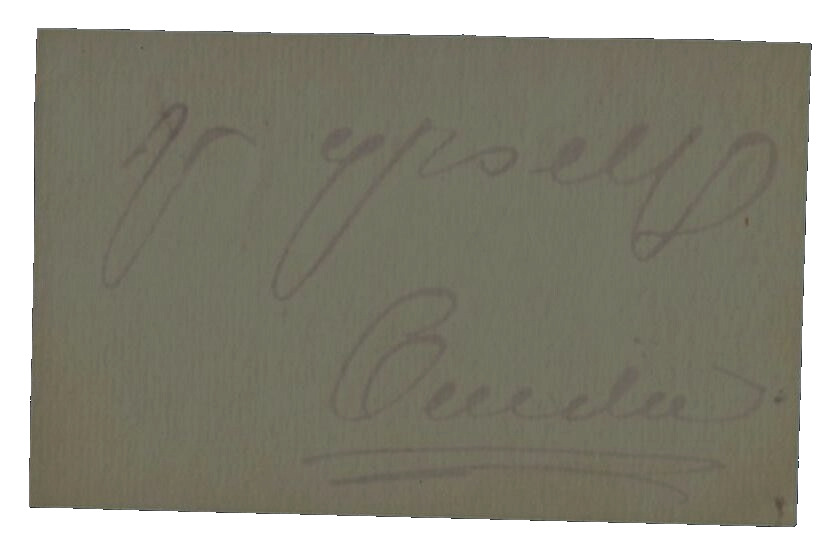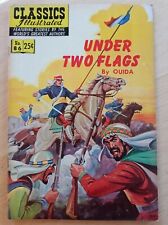When you click on links to various merchants on this site and make a purchase, this can result in this site earning a commission. Affiliate programs and affiliations include, but are not limited to, the eBay Partner Network.
Up for sale a RARE! "Ouida" Maria Louise Ramé Signed 2.25X4 Card.
ES-3602
Ouida (/ˈwiːdə/; 1 January 1839 –
25 January 1908) was the pseudonym of the English novelist Maria Louise Ramé (although
she preferred to be known as Marie Louise de la Ramée). During her
career, Ouida wrote more than 40 novels, as well as short stories, children's
books and essays. Moderately successful, she lived a life of luxury,
entertaining many of the literary figures of the day. Under Two Flags, one
of her most famous novels, described the British in Algeria. It expressed sympathy for the French colonists—with
whom Ouida deeply identified—and, to some extent, the Arabs.
The novel was adapted for the stage, and was filmed six times. Her novel A Dog of Flanders is considered a children's classic
in much of Asia. The American author Jack London cited her novel Signa as one
of the reasons for his literary success. Her lavish lifestyle eventually led
her to penury, and her works were put up for sale to pay her debts. She died
in Italy from pneumonia. Soon after her death, her friends organized a public
subscription in Bury St Edmunds, where they had a fountain for horses and dogs
installed in her name. Maria Louise Ramé was born at Bury St Edmunds, England. Her mother, Susan Sutton, was a
wine merchant's daughter; her
father was from France. She derived her pen name from her own childish
pronunciation of her given name "Louise".Her opinion of her
birthplace fluctuated; she wrote:— "That clean, quiet antiquated town,
that always puts me in the mind of an old maid dressed for a party; that lowest
and dreariest of Boroughs, where the streets are as full of grass as an acre of
pasture land. Why, the inhabitants are driven to ringing their own doorbells
lest they rust from lack of use. She moved into the Langham Hotel, London, in
1867. There, according to the hotel promotional materials, she wrote in bed, by
candlelight, with the curtains drawn to keep out daylight and surrounded by
purple flowers. She ran up huge hotel and florists bills of up to 200 pounds
per week and commanded soirees that included soldiers, politicians, literary
lights (including Oscar Wilde, Algernon Swinburne, Robert Browning and Wilkie Collins), and artists (including John Millais). Many of her stories and characters were based
upon people she invited to her salons at The Langham.[8] Ouida was described by William Allingham in his diary of 1872 as of short
stature, with a "sinister, clever face" and with a "voice like a
carving knife." For many years Ouida lived in London, but about
1871 she moved to Italy. In 1874, she settled permanently with her mother in
Florence, and there long pursued her work as a novelist. At first she rented an
apartment at the Palazzo Vagnonville. Later she removed to the Villa Farinola
at Scandicci, south of Bellosguardo, three miles from Florence, where she lived in great style, entertained largely,
collected objets d'art, dressed expensively but not tastefully, drove good
horses, and kept many dogs, to which she was deeply attached She
lived in Bagni di Lucca for a period, where there is a commemorative plaque on
the outside wall. She declared that she never received from her publishers more
than £1600 for any one novel, but that she found America "a mine of
wealth". In The Massarenes (1897) she gave a lurid
picture of the parvenu millionaire in smart London society. This book was
greatly prized by Ouida, and was very successful in terms of sales. Thenceforth
she chiefly wrote for the leading magazines essays on social questions or literary
criticisms, which were not remunerative. As before, she used her locations as
inspiration for the setting and characters in her novels. The British and
American colony in Florence was satirised in her novel, Friendship (1878).
Ouida considered herself a serious artist. She was inspired by Byron in
particular, and was interested in other artists of all kinds. Sympathetic
descriptions of tragic painters and singers occurred in her later novels. Her
work often combines romanticism with social criticism. In her novel, Puck,
a talking dog narrates his views on society. Views and Opinions includes
essays in her own voice on a variety of social topics. She was an animal lover
and rescuer, and at times owned as many as thirty dogs. Although successful,
she did not manage her money well. A civil list pension of £150 a year was
offered to her by the prime minister, Sir Henry Campbell-Bannerman, on the
application of Alfred Austin, George Wyndham, and Walburga, Lady Paget,
which she reluctantly accepted after request by her friend, Lady Howard of
Glossop, on 16 July 1906.She continued to live in Italy until her death on 25
January 1908, at 70 Via Zanardelli, Viareggio, of pneumonia. She is buried
in the English Cemetery in Bagni di Lucca, Italy








